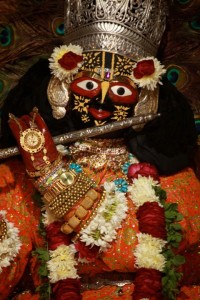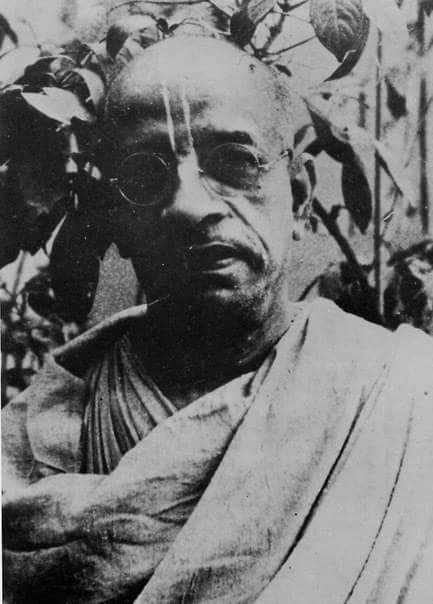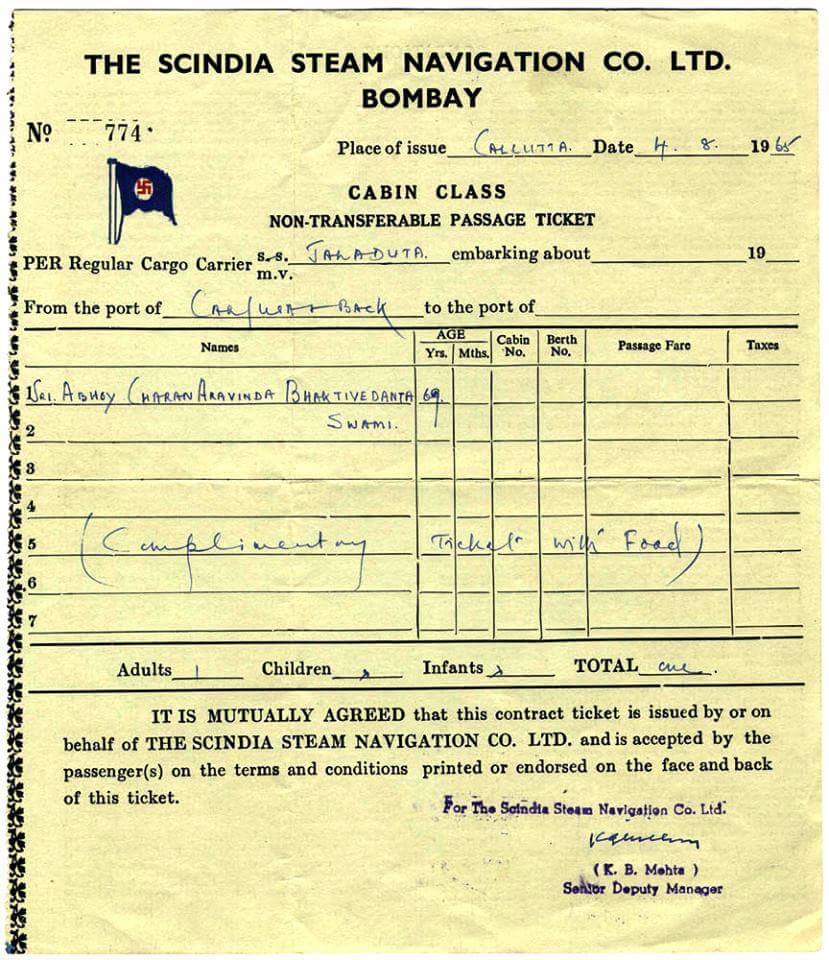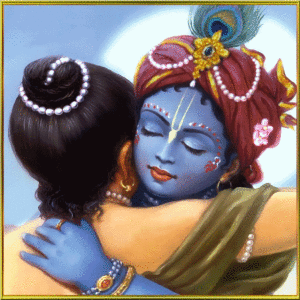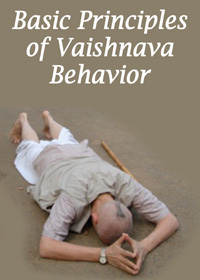
Lover of God- this term evokes different feelings or images in our hearts. Who is a lover of God? What are his symptoms? How does he behave?
And do we know that all of us, yes each one of us, has love of God within our heart and the perfection of our spiritual life is get eternally and permanently reinstated as a lover of God!
Our present condition
By nature, we are lover of God, but here, being illusioned, we think God as our enemy and we don’t like God. We like this māyā.
(SP Lecture, January 9, 1967, New York)
Religion means to awaken that love
Religion means to awaken that Krishna consciousness. That is religion. Sa vai puṁsāṁ paro dharmo yato bhaktir adhokṣaje (SB 1.2.6). That is religion. Religion is not formalities and ritualistic ceremonies. Religion means how to awaken the normal condition, to become lover of God. That is normal condition. Love is there, but because we have no objective, because we have no instruction where to place our love we are loving so many things—up to the dog. Instead of God we are loving dog. Love is there.
(SP Lecture, September 6, 1976, Vrindavan)
An exchange between God and the living entity
The living entity is sanātana. Mamaivāṁśo jīva-bhūtaḥ jīva-loke sanātana. He is sanātana. God is sanātana. The exchange between God and the living entity is called sanātana-dharma or Vaishnavism. So we are teaching that. We are not teaching Hinduism, Muslimism, Christianism. We are teaching how to love God. That’s all. There is no question of proselytization. It is natural. We are, by nature we are lover of God. Just like father and son. The love is already there. It cannot be extinguished. The father and son may be separated for many, many years, but when they come together the affection immediately revives.
( SP room conversation, June 28, 1976, Vrindavan)
We broke this relationship!
Originally every living entity is unimaginably beautiful, intelligent, wealthy, and so strong that his spiritual body lives forever. But we foolishly give up this eternal, blissful situation because we are unwilling to meet the condition for eternal life. The condition is that one should be a lover of the Supreme Personality of Godhead, Krishna. Although love of Krishna is the most exquisite ecstasy, surpassing by millions of times the most intense pleasure of the material universe, we foolishly break off our loving affair with the Supreme Lord and artificially try to become independent enjoyers in the material atmosphere of self-delusion and false pride.
And it’s result…
If one does not become a lover of Kṛṣṇa, his connection with Kṛṣṇa takes place indirectly, through the illusory potency of the Lord.
Caitanya Mahaprabhu came to distribute it
In the human form of life the highest achievement is to attain the platform of love of Godhead. Lord Caitanya did not invent a system of religion, as people sometimes assume. Religious systems are meant to show the existence of God, who is then generally approached as the cosmic order-supplier. But Lord Sri Caitanya Mahaprabhu’s transcendental mission is to distribute love of Godhead to everyone. Anyone who accepts God as the Supreme can take to the process of chanting Hare Krishna and become a lover of God.
Everyone can become a lover of God!
A person who is completely free from sinful activities, such person can become a devotee, a lover of God. So this Kṛṣṇa consciousness movement is teaching to the human society how to become purified. There is no such restriction that “This man can be purified; that man cannot be.” No, there is nothing like that. Everyone can be purified if he desires to be so. So immediately we may not be able to purify. As it is prescribed—no illicit sex, no meat-eating, no gambling, no intoxication—it may not be possible because those who are accustomed, it is difficult to give up. Therefore the process is given very simple: “Chant Hare Krishna.” So purification is absolute. That is necessary. Without purification, you cannot understand God. But the method we are prescribing… Not we are prescribing; it is Caitanya Mahāprabhu’s prescription. We are simply propagating that “Chant Hare Krishna.
( SP Lecture, February 12, 1975, Mexico)
We can begin from any stage
Lust is only the perverted reflection of the love of God which is natural for every living entity. But if one is educated in Krishna consciousness from the very beginning, that natural love of God cannot deteriorate into lust. When love of God deteriorates into lust, it is very difficult to return to the normal condition. Nonetheless, Krishna consciousness is so powerful that even a late beginner can become a lover of God by following the regulative principles of devotional service. So, from any stage of life, or from the time of understanding its urgency, one can begin regulating the senses in Krishna consciousness, devotional service of the Lord, and turn the lust into love of Godhead—the highest perfectional stage of human life.
(BG 3.41p)
A simple process to become a lover of God
So this is the process, how to increase your attachment for Krishna. This bhakti-yoga or Krishna consciousness movement is nothing… We do not say that “You Christian, you are good. I am Hindu, I am bad.” Or “You are bad, I am good.” We don’t say that. We simply say that “It is your right now, this human form of body, how to love God.” That’s all. “You have loved so long dog. Now you try to love God.” That is our propaganda.
So we don’t criticize anyone. Simply we want to see whether he or she has developed his love of God. That’s all. So you can do it either as Christian or as Hindu, as Muhammadan. We don’t care for that. But we want to see you that you are actually lover of God. If you are not, then we tell you, “You try to love God in this way.” What is that? Śravaṇaṁ kīrtanaṁ viṣṇoḥ. Simply hear about Krishna. Simply chant about Krishna. Is that very difficult? If you have not yet learned how to love God, take this process, and you will learn how to love God. This is our propaganda. It is not difficult.
(SP Lecture, June 30, 1972, San Diego)
Heart of a Premi Bhakta
A bona fide lover of God could never forget Him, even in exchange for everything else. The devotee of the Lord cannot be happy in any circumstance without the Lord. In the absence of the Lord the devotee associates with Him by remembering His separation, and because the Lord is absolute, the devotee’s feeling of separation is transcendentally more relishable than direct contact. This is possible only when we develop genuine love for Him. In that state the devotee is always with the Lord by feelings of separation, which become more acute and intolerable in suitable circumstances.
(Light of the Bhagavata 42, Purport)
Premāñjana-cchurita. By prema… Prema means love. The ointment of love, when it is smeared over the eyes, then those who are devotees, santaḥ, saintly persons, they can see always Krishna within his heart. Premāñjana-cchurita-bhakti. Antaḥ. And bahiḥ, so far experience, that he sees everything. One who is lover of God, he can see Krishna in everything.
Whatever he sees, he sees Krishna there, because he knows that “This thing is produced out of Krishna’s energy.” Take for example a flower. A devotee sees a flower produced by Krishna’s energy. He sees the beauty of flower, appreciating Krishna’s artistic sense. When he hears the sweet voice of a bird, he immediately understands that “Krishna is speaking so nicely through this bird.” This is called Krishna consciousness.
(SP Lecture, April 9, 1971, Bombay)
Lover of God
This relationship of attachment is very sublime. It requires time to understand, but there is a position where, instead of asking, “O God, please give us our daily bread,” you can instead think that God will die if you do not supply bread to Him. This is the ecstasy of extreme love. There is such a relationship between Krishna and His devotee Rādhārāṇī, the greatest devotee, the greatest lover of Krishna. Mother Yaśodā is His lover as a parent; Sudāmā is His lover as a friend; Arjuna also as a friend—there are millions and billions of different kinds of direct devotees of Krishna.
( KC- Topmost yoga system, chapter 2)
Among the gopīs, Srimati Radhika is the foremost. She surpasses all in beauty, in good qualities, in good fortune and, above all, in love.”
Among all the gopīs, Srimati Radharani is the most exalted. She is the most beautiful, the most qualified and, above all, the greatest lover of Krishna.
Srila Prabhupada- a lover of God
Śrīla Bhaktisiddhānta Sarasvatī Ṭhākura explains that unless one is directly empowered by the causeless mercy of Krishna, one cannot become the spiritual master of the entire world (jagad-guru). One cannot become an ācārya simply by mental speculation. The true ācārya presents Krishna to everyone by preaching the holy name of the Lord throughout the world. Thus the conditioned souls, purified by chanting the holy name, are liberated from the blazing fire of material existence. In this way, spiritual benefit grows increasingly full, like the waxing moon in the sky. The true ācārya, the spiritual master of the entire world, must be considered an incarnation of Krishna’s mercy. Indeed, he is personally embracing Krishna.
And as soon he becomes a lover of God… Just like I am Indian, but I have come to western countries to teach love of God. It is not that I am satisfied only in myself that I love God, that’s all right. But due to my love to God I love others also, because I am trying to teach them to love God, the same philosophy. So if people take seriously this movement, how to love God, then human society will be first-rate.
( Room conversation, September 5, 1971, London)
Therefore this love of God cannot be distributed by anyone unless he is empowered by God. No ordinary man can, if he’s not a lover of God.
(SP Lecture, August 26, 1971, London)
I hope the above compilation was satisfying and pleasing to the lotus feet of all the devotees. I pray that by reading the words of Srila Prabhupada we feel inspired to become a serious and sincere devotee, and also aspire to become an eternal servant of a lover of God.
All glories to Srila Prabhupada
Your servant,
Giriraj dasa

